List of Hindu festivals: Difference between revisions
m Reverted edits by 2405:204:A305:3A4A:F0FC:DF7B:66AE:4296 (talk) (HG) (3.4.4) |
|||
| Line 336: | Line 336: | ||
==References== |
==References== |
||
{{reflist|colwidth=30em}} |
{{reflist|colwidth=30em}} |
||
[http://www.indianfestival.in '''Indian Festival Web'''] |
|||
==External links== |
==External links== |
||
Revision as of 15:00, 10 October 2018
There are a great number of Hindu Religious Festivals held throughout the world. A festival Puja, Homa, aarti etc. The festivals typically celebrate events from Hindu mythology, often coinciding with seasonal changes. There are many festivals which are primarily celebrated by specific sects or in certain regions of the Indian subcontinent.
The festive season in India is the most widely celebrated and rejoiced by the people. Festivals not only have a historic significance to them, they are rooted in various cultural and linguistic norms associated with them. The festivities have their own spark, they bring together, or in other words, unite people of different religions and sects into a unified whole. With so many festivals always round the corner, there is a wave of liveliness and celebration in the society. Bringing people together is just one aspect of it, festivals hold with them the sacred cultural roots and traditions that is unique to every festival. The onset of the famous Diwali marks the beginning of lighting 'diyas', beautifying homes, offering gifts and visiting our near and dear ones. Similarly, the Holi festival is said to be the 'Festival of Colors", with its magnificent rain dance and the 'gulaal', it surely colors the lives of people.
Terminology
Utsava
'Utsava' is the Sanskrit word for Hindu festivals, meaning 'to cause to grow 'upward'.[citation needed] Uthsava or Utsava or Utsav is derived from the Sanskrit word, Utsava. The Sanskrit word Utsava comes from the word "ut" meaning "removal" and "sava" which means "worldly sorrows" or "grief".[1]
Observance periods (tithi)
In the Hindu calendar dates are usually prescribed according to the lunar calendar. In Vedic timekeeping, a tithi is a lunar day.
Sublists
- List of Hindu festivals in Punjab
- List of festivals observed at Jagannatha Temple, Puri
- List of Sindhi festivals
List and descriptions of major Hindu festivals
| Major Hindu Festivals | Photo | Hindu tithi of observance | Descriptions | |
|---|---|---|---|---|
or Pongal and Lohri |
 |
Makara Sankranti or Pongal marks the transition of the Sun into Makara rasi. It marks the gradual increase of the duration of the day. Pongal is the first day of Uttarayana and coincides with the beginning of the Tamil month of Thai. |
Pongal is one of the most popular harvest festivals of Tamil Nadu. Pongal occurs in the middle of January every year and marks the auspicious beginning of Uttarayana (sun's journey northwards). The Pongal festival lasts for four days. Celebrations include a drawing of Kolam, swinging & the cooking of delicious Pongal.[2] This day coincides with Makara Sankranti. Pongal is also commemorated by Jallikattu as a part of festivities as a sport of valor The festival is celebrated mostly on January 14 of the Gregorian calendar | |
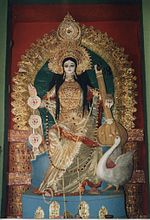 |
Fifth day of the waxing moon of Magh (Hindu calendar) | Vasant Panchami (also called Saraswati Puja by Bengalis and Odias) is celebrated for the blessing of Saraswati, goddess of wisdom and the arts.[3] | ||
or Kavadi |
 |
The full moon day of the Tamil month of Thai | Thaipusam is a Hindu festival celebrated mostly by the Tamil community. The word Thaipusam is derived from the Tamil month name Thai and Pusam, which refers to a star near the location of the moon during the festival. The festival commemorates the occasion when Parvati gave Murugan a spear so he could vanquish the evil demon Soorapadman.
Kavadi Attam (Tamil:காவடி ஆட்டம்) is a dance performed by the devotees during the ceremonial worship of Murugan, the Tamil God of War.[4] It is often performed during the festival of Thaipusam and emphasises debt bondage. The Kavadi itself is a physical burden through which the devotees implore for help from the God Murugan.[5] | |
 |
Thirteenth night of the waning moon of Magh (Hindu calendar) | Maha Shivaratri is the great night of Shiva, during which followers of Shiva observe religious fasting and the offering of Bael (Bilva) leaves to Shiva. Mahashivaratri Festival or ‘The Night of Shiva’ is celebrated with devotion and religious fervor in honor of Lord Shiva, one of the deities of Hindu Trinity. Shivaratri falls on the moonless 14th night of the new moon in the Hindu month of Phalgun, which corresponds to the month of February - March in English Calendar. Celebrating the festival of Shivaratri devotees observe day and night fast and perform ritual worship of Shiva Lingam to appease Lord Shiva. To mark the Shivratri festival, devotees wake up early and take a ritual bath, preferably in river Ganga. After wearing fresh new clothes devotees visit the nearest Shiva temple to give ritual bath to the Shiva Lingum with milk, honey, water etc. On Shivaratri, worship of Lord Shiva continues all through the day and night. Every three hours priests perform ritual pooja of Shivalingam by bathing it with milk, yoghurt, honey, ghee, sugar and water amidst the chanting of “Om Namah Shivaya’ and ringing of temple bells. Nightlong vigil or jaagran is also observed in Shiva temples where large number of devotees spend the night singing hymns and devotional songs in praise of Lord Shiva. It is only on the following morning that devotee break their fast by partaking prasad offered to the deity.[6] | ||
  |
Full moon of the Phalgun month (Hindu calendar) | Holi or Phagwah is a popular spring festival. Holi commemorates the slaying of the demoness Holika by Lord Vishnu's devotee Prahlad. Thus, the festival's name is derived from the Sanskrit words "Holika Dahanam", which literally mean "Holika's slaying". The festival is called Shigmo and Shimga in Goa and rural Maharashtra respectively. | ||
 |
Shigmo is celebrated in Goa as one of the prominent festivals of the Konkani Hindu community.The main festival coincides with Holi. | |||
| In Maharashtra and parts of Madhya Pradesh, the festival of colors is celebrated five days after Holi on Rang Panchami, . | ||||
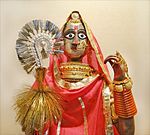 |
"Gangaur" is the colourful and the one of the most important festivals of people of Rajasthan and is observed throughout the state with great fervour and devotion by womenfolk who worship Gauri, the consort of Lord Shiva during March–April. | |||
 |
First nine days of the Chaitra month (Hindu calendar) | Navratri is the Hindu festival of worship and dance. In Sanskrit the term literally means "nine nights". During this festival the forms of Shakti are worshipped, and effigies are burned. | ||
 |
Ninth of the Chaitra month (Hindu calendar) | Rama Navami is the celebration of the birth of Rama. Rama Navami is the day on which Lord Rama, the seventh incarnation of Lord Vishnu, incarnated in human form in the land of Ayodhya. He is the ardha ansh of Vishnu or has half the divinitive qualities of Lord Vishnu. The word “Rama” literally means one who is divinely blissful and who gives joy to others, and one in whom the sages rejoice. Ram Navami falls on the ninth day of the bright fortnight in the month of Chaitra (April/May) and coincides with Vasant Navratri or Chait Durga Puja. Therefore, in some regions, the festival is spread over nine days. This day, marking the birthday of Lord Rama, is also observed as the marriage day of Rama and Sita and thus also referred to as Kalyanotsavam. In Ayodhya, the birthplace of Lord Rama, a huge fair is held with thousands of devotees gathering to celebrate this festival. The fair continues for two days, and rathyatras, carrying the Deities of Ram, his brother Laxman, His wife Sita, and His greatest devotee Mahavir Hanuman, are taken out from almost all Ram Temples. Hanuman is known for is his devotion to Rama, and his tales form an important part of the celebration. In Andhra Pradesh, Ram Navami is celebrated for 10 days from the Chaitra saptami to the Bahula Padyami that fall in the month of March and April. Temples re-enact the marriage of Lord Rama and Sita to commemorate this event, since this day is also the day they got married.[7] | ||
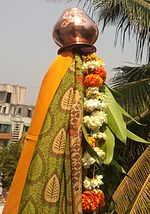 |
First Day of waxing moon of Chaitra (Hindu calendar) | Gudhi Padwa / ChetiChand is celebrated on the first day of the Hindu Lunar month of Chaitra, and is celebrated as New Year's Day by Marathis, Konkanis and Sindhis . According to the Brahma Purana, this is the day on which Brahma created the world. | ||
 |
Ugadi (meaning "the start of an era" in Kannada) is New Year's Day for the Kannadigas and Telugus. | Called Gudi Padwa in Maharashtra | ||
 |
First day of solar month of Vaisakha. | Mesha Sankranti (also called Vaisakha Sankranti) represents the transition of the sun into the Mesha (Aries) Zodiac. Marks the start of the solar new year in lunisolar calendars. Involves bathing in holy waters. Regional new year festivals are also observed on this day such as Vishu, Pohela Boishakh and Vaisakhi. Represents the vernal (Spring) equinox. | ||
 |
Vishu is a Hindu festival celebrated in Kerala. It falls around 14 April of the Gregorian year. | |||
| The Tamil New Year follows the Nirayan vernal equinox. it falls around 14 April of the Gregorian year. | ||||
 |
Vaisakha/Bohag (Assamese calendar) – The first month of Hindu calendar | Rongali Bihu (mid-April, also called Bohag Bihu), the most popular Bihu celebrates the onset of the Assamese New Year (around 15 April) and the coming of Spring. | ||
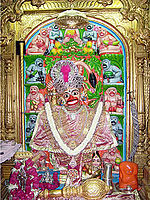 |
Hanuman Jayanti is the celebration of the birth of Hanuman, Rama's loyal devotee. To mark the birth of Lord Hanuman, Hanuman Jayanti is celebrated all over India in the month of Chaitra in Hindu calendar. The great Hanuman is known for its great strength, power and his immortal devotion towards Lord Rama. He is considered to be a greatest follower of Lord Rama and played a crucial role in his life. He is considered to be as one of the most powerful Hindu gods in India. Celebrations on Hanuman Jayanti began early in the day with special puja being performed by devotees. Devotees perform holy Puja in temples dedicated to Sri Hanuman or at Home. People in India organize special prayers for Lord Hanuman to get rid of evil spirits. The God is known for its magical powers. Prayers and Hymns are sung all day long in various Hanuman temples dedicated to the lord. Hanuman is considered as a symbol of Power and great strength in Hindu mythology. On auspicious day of Hanuman Jayanti, People apply red Sindoor from Lord's feet on their foreheads. This is considering being a ritual for good health and good luck.[8] | |||
| Sixth day of the bright fortnight of the month of Jyestha (Hindu calendar) | The marriage of Shiva and Parvati is celebrated as Sitalsasthi. It is celebrated as a carnival, in which people and artists from different walks of life participate, making it more beautiful and bringing out the true colour of life. | |||
 |
Full moon of Jyeshta (Hindu calendar) | Vat Pournima is observed in Maharashtra. Pournima means "full moon." Women pray for the prosperity of their husbands by tying threads around a banyan tree. | ||
 |
Bonalu is a festival celebrated for a Mother Goddess ( such as the goddesses Pochamma, Yellamma, etc.) in the Telangana. | |||
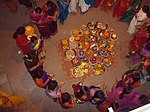 |
Bathukamma is a festival celebrated during the months of September and October in 10 districts of Telangana. | |||
 |
Second to tenth day of waxing moon phase of month Ashadha (Hindu Calendar) | Rath Yatra is the festival associated with Jagannath.It is the most important festival of Bengalis and Odias . | ||
 |
The second day(Raja Shankranti) signifies beginning of the solar month of Mithuna | Raja Parba is a four-day-long festival. It inaugurates and welcomes the agricultural year all over Odisha. | ||
 |
Full moon of Ashadh (Hindu calendar) | Guru Purnima is the day devotees offer puja (worship) to their Guru. This was also the day when Vyasa, author of the Mahabharata was born. | ||
 |
Mahalakshmi Vrata is a puja performed by married Hindu women to seek the blessings of Mahalakshmi, goddess of wealth and prosperity. | |||
 |
Onam Onam is the harvest festival of Kerala. Though Onam is traditionally a Hindu festival celebrated in Kerala, contemporarily Onam is celebrated by the Kerala diaspora across the globe. Onam commemorates the rule of Mahabali, an Asura(demon) king who loved his subjects. During his rule people were happy, honest and full of righteousness. Legend says Lord Vishnu took the incarnation of Vamana, a dwarf Brahmin who visited Mahabali seeking three steps of land for sitting in self denunciation. Cleverly Vamana defeated Mahabali and sent him to the netherworld. Onam is the annual homecoming of the legendary Emperor Mahabali. It falls during the month of Chingam (August–September) and lasts for ten days. The festival is marked by various festivities, including intricate flower carpets, elaborate banquet lunches, snake boat races, Onappottan, Kaazhchakkula in Guruvayoor, Puli Kali, Kaikottikkali etc. These festivities make Onam a unique festival on the earth which is embellished by most number of cultural elements and it can be undoubtedly said that these elements constitute the colorfulness, diversity and richness that no other festival can claim.On Onam day people conduct special prayers in Hindu temples.Although Prayers in Hindu temples are important part of the festival, non-Hindus are not allowed to enter temples.. | |||
 |
Full moon of Shravana (Hindu calendar) | Raksha Bandhan is a festival celebrated mainly in northern Indian states. Rakhi is a special occasion to celebrate the chaste bond of love between a brother and a sister. | ||
| Third day after Raksha Bandhan | "Teejdi" is a festival of Sindhis. On this day Sindhi ladies observe a day long fasting for longer life of their husbands. They take dinner after "Chandra Darshan" i.e. seeing Moon. | |||
 |
Eighth day of waning moon of Bhadrapad (Hindu calendar) | Krishna Janmaashtami is the Hindu festival celebrating the birth of Krishna. It is actually called as Krishna Jayanthi. The date falls not only on the eighth day of the waning moon of Bhadrapad, but always on Rohini Nakshatra. Janmashtami, the birthday of Lord Krishna is celebrated with great devotion and enthusiasm in India in the month of July or August. According to the Hindu calendar this religious festival is celebrated on the Ashtami of Krishna Paksh or the 8th day of the dark fortnight in the month of Bhadon. Sri Krishna is considered as the one of the most powerful human incarnations of the Lord Vishnu. He was born around 5,200 years ago in Mathura. The sole objective of Sri Krishna's birth was to free the Earth from the evilness of demons. He played an important role in Mahabharata and propagated the theory of bhakti and good karma which are narrated deeply in the Bhagwat Geeta. Sri Krishna was born in a prison in the custody of Kansa. Vasudev, His father immediately thought of his friend Nand and decided to hand over his child to him to save Krishna from the clutch of Kansa. Krishna grew up in Gokul and finally killed his uncle, King Kansa. The actual celebration of Janmashtami takes place during the midnight as Sri Krishna is believed to be born on a dark, stormy and windy night to end the rule and violence of his uncle, Kansa. All over India this day is celebrated with devotional songs and dances, pujas, arti, blowing of the Conch and rocking the cradle of baby Sri Krishna. The Janmashtami celebration of Mathura and Vrindavan, the places where Sri Krishna had spent his life, are very special. On this day temples and homes are wonderfully decorated and illuminated. Night long prayers are offered and religious mantras are sung in the temples.[9] | ||
| Eighth day of waxing moon of Bhadrapad (Hindu calendar) | Radhastami is celebrated all across India especially in Northern India on Bhadrapad Shukla Paksha Ashtami as birth anniversary of Goddess Radha, consort of lord Krishna. | |||
| Gowri Habba is celebrated in Karnataka, Andhra Pradesh, and Tamil Nadu. Gowri is worshipped for her ability to bestow courage to her devotees. Newly wed couples are invited to the house of the groom's parents and served with varieties of food. | ||||
 |
Fourth day of the waxing moon of Bhadrapada (Hindu calendar) | Ganesh Chaturthi is the celebrated as the arrival of Ganesh on the earth. It is very important festival in Maharashta. Ganesh Festival celebrated in Pune in very traditional way. | ||
| Fifth day of the waxing moon of Bhadrapada (Hindu calendar) | Nuakhai is celebrated to welcome the new rice of the season. This is an agricultural festival mainly observed by people of western Odisha (Kosal). | |||
 |
First nine nights of the waxing moon of Ashvin | Navarathri is the Hindu festival of worship and dance. In Sanskrit the term literally means "nine nights". During this festival the forms of Shakti are worshiped. Literally “nine nights”, this nine – day period from the new moon day to the ninth day of Ashvin is considered the most auspicious time of the Hindu calendar and is hence the most celebrated time of the year. Although it has different names in different parts of India, Hindus from all regions celebrate it. From Kashmir in the North to Tamil Nadu in the South, and from Gujarat in the West to Sikkim in the East, it is celebrated with great enthusiasm as the conquest of good over evil. Every region has its own myths and reasons to explain this. The nine different aspects of Devi are worshipped over the nine days. | ||
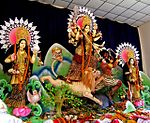 |
First ten nights of the waxing moon of Ashvin | These are the most popular forms under which she is worshipped: Durga, goddess beyond reach; Kali, the auspicious power of time; Amba or Jagdamba, mother of the world; Annapurna, giver of food and plenty; Sarvamangala, auspicious goddess; Bhairavi, terrible, fearful, power of death; Chandika or Chandi, violent, wrathful, furious; Lalita, playful; Bhavani, giver of existence;Tara, giver of success in work. It is the most important festival of Bengalis and Odias . | ||
| Tenth day of waxing moon of Ashvin (Hindu calendar) | Vijayadashami is the Hindu celebration of good over evil. | |||
 |
New moon of Ashvin (Hindu calendar) | Deepavali which means "row of lights/lamps" in Kannada and Telugu and Marathi and Sanskrit is called "Diwali" in North India, Deepa means lamp and in Hindi a lamp is mostly called a Diya or Di. The festival is celebrated on the occasion of Lord Krishna and his wife Satyabhama killing a demon Narakasura. Another story says the festival is celebrated for the return of Rama and Sita to the kingdom Ayodhya after fourteen years of exile.
Rama is exiled to the forest for 14 years, his devoted wife Sita and humble brother Laxman decide to join him, after 14 years the whole village know he is returning so light lamps or 'divas' to guide him, his wife and brother home. So every year lamps are lit to represent Rama finding his way back home after the harsh punishment of being sent to exile in the forest. | ||
| Second day of the waxing moon of Kartik (Hindu calendar) | Bhai dooj, also referred to as Bhaubeej in Marathi, is the ceremony performed by Hindus, generally, on the second day of Deepavali. It is celebrated among brothers and sisters and is similar to Raksha Bandhan, except there is no tying of rakhi involved. | |||
| 15th of the Full moon day of Kartik (November–December) | A unique festival is celebrated in Varanasi this day which is called Dev Devali. The Kartik Purnima festival also coincides with the Jain light festival and Guru Nanak Jayanti | |||
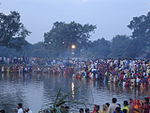 |
Chhath is mainly observed in Bihar and Terai, but is also celebrated elsewhere. It is a festival dedicated to the Sun God for bestowing the bounties of life and fulfilling wishes. | |||
| Skanda Sashti is decided on lunar month during sixth day of Karthika Masam (October–November). It is one of the most important festival dedicated to Lord Murugan the second son of Shiva. On this festival is celebrated the victory of Murugan against the Asuras. | ||||
| Champa Sashti festival is a six-day festival observed from the first to the sixth of the Hindu month of Margashirsha (November – early December). It is one of the most important festival dedicated to Lord Khandoba.This festival celebrates the victory of Khandoba against the demons Mani-Malla. | ||||
| After 8 days of Kartik Purnima | Prathamastami is a festival that originated in Odia. It is held on the eighth day of the month of Agrahayana, when older female relatives pray for the prosperity of their eldest child. The festival is followed by rituals and recitations of the Glory of Mahalakshmi and Shashti devi. | |||
 |
Yatra (also Zatra and jatra) refers to the pilgrimage festivals celebrated at Hindu temples. Idols and murtis are taken out on special procession in a palkhi (a palanquin) or a chariot called the rath. Every temple observes this festival once a year on the traditional day. Palkhi is main tradition of Maharashtra. Sant Dhnyaneshwar had started the palkhi from Alandi (Pune) to Pandharpur. Every year Marathi people celebrates Palkhi from Alandi and Dehu to Pandharpur. | |||
 |
Karthikai Deepam is an ancient festival of lights celebrated by Tamil Hindus on the full moon day of Karthikai month (November/December). This occurs on the day when the moon is in conjunction with the constellation Karthigai (Pleiades) and purnima. It is the same as Kartik Poornima; however, since Tamils follow the Hindu Solar calendar with correction for precession of the equinoxes, the Tamil date matches the actual constellation. | |||
| A Winter Solstice celebration that lasts five days. | Pancha Ganapati is a modern Hindu festival celebrating Lord Ganesha, the Five-Faced Maha Ganapati—Lord of Categories[citation needed]. | |||
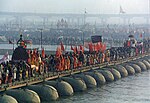 |
A pilgrimage made every four years to the Ganges river | The Purna (complete) Kumbh takes place every twelve years, and is an ordinary large Kumbh Mela. The Ardh (half) Kumbh Mella, a smaller Kumbh Mela, is celebrated every six years. The normal Kumbh Mela is celebrated every 4 years. The Maha (great) Kumbh Mela, a special large Kumbh Mela, occurs every 12 'Purna Kumbh Melas', or 144 years. | ||
or Purna Kumbha Mela |
 |
Godavari Pushkaram or Godavari Pushkaralu is most commonly stated as it is the festival of the river Godavari. The main significance of this Godavari Pushkaralu is that It occurs once in every 12 years in other words called as Pushakara. The river Godavari took it birth at triambakeswar of Nasik which is located in Maharashtra state. It flow along the various regions of Telangana and Andhra Pradesh and finally flows into the Bay of Bengal.Maha Pushkaralu which comes once in 144 years.
Main centre's that celebrate Pushkaram are Rajahmundry, Bhadrachalam, Trimbakeshwar & Nasik.Most of the Godavari River is connected with Rajahmundry, where it has wide spread across the city. | ||
| Sama Chakeva | "Sama Chakeva (Nepali or Hindi: सामाचकेवा) is an important festival observed by Mithila region that extends from Terai of Nepal to Bihar and Jharkhanda states of India. With great enthusiasm, young brothers and sisters celebrate this festival in the month of Kartik as per Bikram Sambat Calendar, which is in the month of November, when birds traditionally begin the migration of beautiful and colourful birds from the Himalayas to plain parts of Nepal (Terai) and India. This festival demonstrates love and affection between brothers and sisters.
This festival begins immediately after the conclusion of Chhath festival in Nepal and northern parts of India, and ends on the full moon day of Kartik, that coincides in the month of November."[11] | |||
| Tulsi Pujan Diwas Festival | December 25 every year | Tulsi Pujan Diwas is celebrated on December's 25 by Hindus in India. Tulsi in Hinduism is used for medicinal and spiritual use. It is considered sacred in Hinduism and it is believed that Tulsi brings prosperity. | ||

|
Fifth day of Shravan month of the Lunar calendar | Naga Panchami is a traditional worship of snakes or serpents observed by Hindus throughout India, Nepal and other countries where Hindu adherents live. |
See also
'Hindu festival related concepts
- Coconut: use for worship
- Culture of India
- Dhupa
- Hindu prayer beads
- Hindu temple
- Incense of India
- Mala
- Mudras
- Namaste
- Pranāma
- Pādodaka
- The Archaeology of Hindu Ritual
Others
- Buddhist prayer beads
- Guru-shishya tradition
- Jain festivals
- Lists of festivals
- Puja (Buddhism)
- Religstival
References
- ^ Sri Venkateswara Swami Temple of Greater Chicago
- ^ [1], Pongalfestival.org.
- ^ Friedrichs, Kurt (1994). "Sarasvatī". In Schuhmacher, Stephan; Woerner, Gert (eds.). The Encyclopedia of Eastern Philosophy and Religion: Buddhism, Hinduism, Taoism, Zen. Boston: Shambala. p. 306. ISBN 0-87773-980-3.
The goddess of ... scholarship ... She is also the patron of the arts, especially of music.
- ^ Kent, Alexandra. Divinity and Diversity: A Hindu Revitalization Movement in Malaysia. University of Hawaii Press, 2005. (ISBN 8791114896)
- ^ Hume, Lynne. Portals.
- ^ "Mahashivaratri Festival : Festival of Shivratri, Mahashivratri Festival India - Mahashivaratri Festival 2019". Mahashivratri.org. Retrieved 2018-04-22.
- ^ "Rama Navami - Hindupedia, the Hindu Encyclopedia". Hindupedia.com. Retrieved 2018-04-22.
- ^ "Hanuman Jayanti - Hanuman Jayanti 2018 Date - Celebrations in India". Indiaonlinepages.com. 2018-03-31. Retrieved 2018-04-22.
- ^ "Janmashtami / Krishna Janmashtami : A hindu religious festival". Calendarlabs.com. 2018-03-09. Retrieved 2018-04-22.
- ^ "Indian Festivals". Webonautics.com. Retrieved 2018-04-22.
- ^ "Sama Chakeva". Wikipedia. 2017-11-06.
